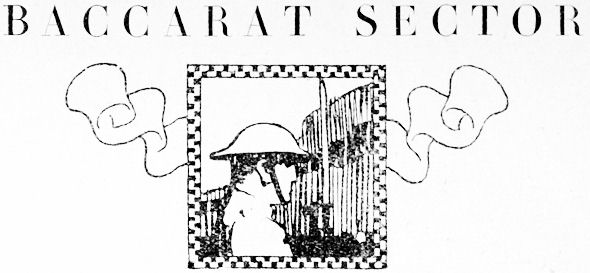|
The thirty-seventh's bit in the world's war
of 1914-1918 : a brief story
H. W. Fenker
BACCARAT SECTOR

THE Baccarat Sector, in the
Vosges mountains, taken over by the troops of this Division,
extended for a distance of fifteen kilometers from the Forest
des Elieux, north of the village of Badonviller, through the
Bois Communal de la Woevre, Bois des Haies, the villages of
Merviller and Ancerviller, along the edge of Bois Banal to the
southern edge of the Bois des Pretres. While this sector, in the
beautiful wooded hills and mountains of the Vosges, was
considered inactive, it was a position of responsibility and
just as much effort and hard work were expended in its
preservation as if it were the most vital part of the great
battle line extending from the North Sea to the Border of
Switzerland. Truly every foot of that long line had to be
securely held.
Here the men of the Division had their initial training under
fire, and although under continual observation, interrupted by
enemy artillery and aeroplanes, training continued. During the
period of six weeks that the Division held this sector, each
night when the weather permitted, enemy aeroplanes would raid
Baccarat and vicinity. Two of these raids were particularly
heavy. From our side the score was more than evened by
successfully carrying out one large gas projector attack against
the enemy and by destroying with aeroplane bombs his dumps at
Cirey and Blamont. The first patrols composed of men of the 37th
Division to enter contested territory, were sent out during the
first week of occupation in this sector and every night
thereafter they stalked the enemy in No-Man's-Land. Each patrol
added boldness to the next and so agressive did they become,
that soon absolute control was maintained over No-Man's-Land.
Two large raids during the last week of stay in the Baccarat
Sector, penetrated the enemy lines for over a kilometer,
returned with prisoners and without the loss of a single man.
While in this sector the Division was supported by French
Artillery, and operated directly under the 6th French Corps,
commanded by General Duport. Upon relief, 16 September, 1918,
the following commendatory Special Order was issued :
|